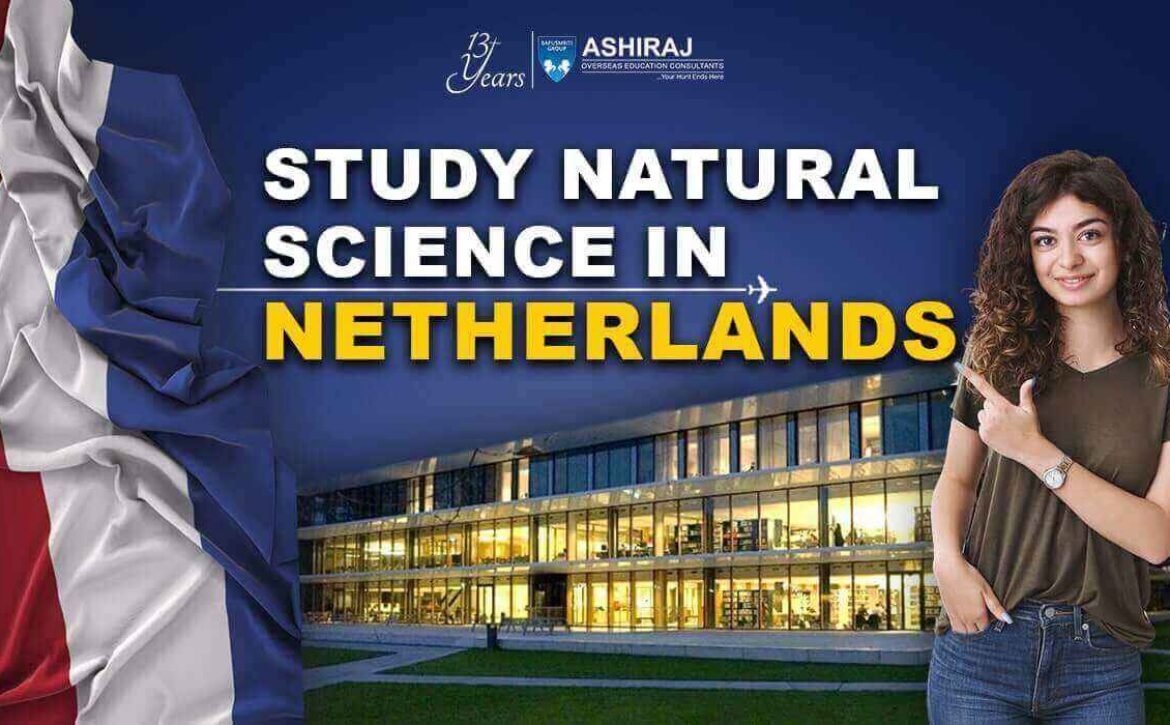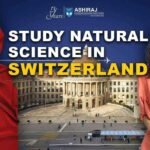
Natural Science in Netherland
Exploring the realm of Natural Science in the Netherlands unveils a captivating tapestry of innovation and research. Nestled in this picturesque country, scientific endeavors seamlessly blend with the rich cultural and historical landscape, creating a unique environment for academic pursuits. The Netherlands, renowned for its progressive approach to education and research, fosters a thriving community of scientists and scholars dedicated to unraveling the mysteries of the natural world.
Natural Science in the Netherlands encompasses a diverse array of disciplines, from biology and chemistry to physics and environmental studies. The academic institutions here stand as bastions of knowledge, facilitating groundbreaking research that contributes to global scientific advancements. With state-of-the-art facilities and a collaborative ethos, the Netherlands emerges as a hub where intellectual curiosity meets practical application, shaping the future of Natural Science on both a local and global scale.
Why to Study Natural Science in the Netherlands?
- Cutting-edge Research Facilities: The Netherlands boasts world-class laboratories and research centers, providing students in Natural Science with access to state-of-the-art equipment and technologies.
- Global Perspective: Studying Natural Science in the Netherlands offers a truly international experience. Interact with a diverse community of scholars and researchers, gaining insights from various cultural perspectives.
- Innovative Academic Programs: Dutch universities are known for their innovative and interdisciplinary Natural Science programs, ensuring students receive a well-rounded education that prepares them for the dynamic challenges of the scientific field.
- English as the Medium of Instruction: With a majority of programs offered in English, international students find it easy to adapt and excel in their studies, eliminating language barriers.
- Career Opportunities: The Netherlands’ strong ties to industry and research institutions open doors to unparalleled internship and job opportunities, allowing students to apply theoretical knowledge in real-world settings.
- Quality of Life: Beyond academics, the Netherlands offers a high quality of life. Rich cultural experiences, a vibrant social scene, and a welcoming environment make it an ideal place for international students pursuing Natural Science.
Embark on a transformative academic journey by choosing to study Natural Science in the Netherlands. With its innovative programs, global outlook, and advanced research facilities, the country sets the stage for a successful and fulfilling scientific career.
Top Universities to Study Natural Science in Netherlands
Rank | University | QS World University Ranking 2023 | Type of University | Average Annual Fees (EUR) | Programs Offered |
1 | University of Amsterdam | 58 | Research University | 2,168 – 15,000 | Physics, Chemistry, Biology, Environmental Science |
2 | Delft University of Technology | 104 | Technical University | 8,464 – 13,226 | Applied Physics, Chemical Engineering, Aerospace Engineering |
3 | Wageningen University & Research | 125 | Agricultural University | 12,000 – 15,000 | Environmental Sciences, Biotechnology, Plant Sciences |
4 | Utrecht University | 121 | Research University | 2,168 – 15,000 | Earth Sciences, Pharmaceutical Sciences, Astronomy |
5 | Leiden University | 128 | Research University | 2,168 – 15,000 | Molecular Science and Technology, Astronomy, Physics |
Embarking on a journey in Natural Science in the Netherlands is a strategic choice given the global recognition of its top universities. The University of Amsterdam, ranked 58th globally, offers diverse programs in Physics, Chemistry, Biology, and Environmental Science, with fees ranging from 2,168 to 15,000 EUR annually. Technical enthusiasts can explore Delft University of Technology (104th) for Applied Physics, Chemical Engineering, and Aerospace Engineering, with fees between 8,464 and 13,226 EUR. Wageningen University & Research (125th), known for Agricultural Sciences, charges 12,000 to 15,000 EUR, while Utrecht University (121st) covers Earth and Pharmaceutical Sciences with fees from 2,168 to 15,000 EUR. Leiden University (128th) excels in Molecular Science, Astronomy, and Physics, offering programs within the 2,168-15,000 EUR range. Embrace quality education and global opportunities in Natural Science in the Netherlands.
Course Curriculum for Natural Science in Netherlands
- Interdisciplinary Approach: Natural Science programs in the Netherlands embrace an interdisciplinary curriculum, allowing students to explore the intersections of physics, chemistry, biology, and environmental sciences.
- Research-Driven Learning: With a strong emphasis on research, students engage in hands-on projects, contributing to ongoing scientific inquiries. This approach ensures a practical understanding of theoretical concepts.
- Cutting-edge Technologies: The curriculum integrates the latest technologies, exposing students to state-of-the-art equipment and methodologies. This focus prepares graduates to navigate the evolving landscape of scientific advancements.
- Global Perspectives: Natural Science programs in the Netherlands are designed to provide a global perspective. Students collaborate with peers from diverse backgrounds, fostering an inclusive and enriching learning environment.
- Tailored Specializations: Recognizing the breadth of Natural Science, programs often offer tailored specializations. Whether in environmental sciences, biotechnology, or astronomy, students can align their studies with their specific interests and career goals.
Embarking on a Natural Science journey in the Netherlands unveils a curriculum meticulously crafted for academic excellence and real-world application. The intersection of theory, research, and global perspectives makes the Netherlands a beacon for those aspiring to excel in Natural Science. Embrace the dynamic course offerings and immerse yourself in the evolving world of Natural Science in the Netherlands.
Eligibility Criteria & Admission Requirements for Natural Science in Netherlands
- Academic Requirements:
Applicants must hold a relevant bachelor’s degree in Natural Science or a related field from a recognized institution.
A minimum GPA of 3.0 on a 4.0 scale is typically required.
- Language Proficiency:
Proficiency in English is essential. Applicants can submit either IELTS or TOEFL scores.
Test | Minimum Score |
IELTS | 6.5 |
TOEFL (iBT) | 90 |
- Standardized Tests:
Depending on the university, applicants may need to provide GRE or GMAT scores.
Test | Minimum Score |
GRE | 310 |
GMAT | 600 |
- Documentation:
Valid passport and student visa are mandatory.
Academic certificates showcasing previous qualifications.
Some programs may require relevant work experience in the field.
Ensuring compliance with these eligibility criteria is crucial for a successful application to Natural Science programs in the Netherlands. Applicants should diligently prepare and submit the required documentation, demonstrating their academic prowess and language proficiency. The combination of these factors paves the way for a rewarding academic journey in Natural Science in the Netherlands.
Documents Required for Studying Natural Science in Netherlands
- Identity and Qualifications:
Valid passport: Ensure it remains valid throughout your intended stay.
Official high school transcripts and educational certificates showcasing academic qualifications.
- Two Letters of Recommendation (LOR): Provide insights into your academic and professional capabilities.
- Statement of Purpose (SOP): Articulate your aspirations, academic interests, and reasons for choosing Natural Science in the Netherlands.
- Curriculum Vitae (CV): Highlighting academic achievements, research experiences, and relevant skills.
- Work Experience Certificate: If applicable, demonstrate your professional background in the field of Natural Science.
- Proof of Financial Resources: Showcase your ability to cover tuition, living expenses, and other associated costs.
Submitting a comprehensive set of documents is integral to a successful application for Natural Science programs in the Netherlands. Ensure accuracy and completeness, as these documents not only validate your eligibility but also provide insights into your character, commitment, and potential contributions to the academic community. Natural Science in the Netherlands beckons, and meticulous documentation is your key to unlocking this enriching academic opportunity.
Admission Process for Natural Science in Netherlands
- Research and Choose Programs: Explore Natural Science programs in the Netherlands, considering factors like specialization, faculty expertise, and program structure. Ensure alignment with your academic and career goals.
- Check Eligibility Criteria: Review the specific admission requirements for your chosen programs. This may include academic qualifications, language proficiency (IELTS or TOEFL), and standardized test scores (GRE or GMAT).
- Gather Essential Documents: Assemble a comprehensive set of documents, including a valid passport, academic transcripts, educational certificates, Letters of Recommendation (LOR), Statement of Purpose (SOP), and a Curriculum Vitae (CV).
- Prepare for Language Proficiency Tests: If required, take either the IELTS or TOEFL and achieve the minimum scores. Additionally, prepare for and take the GRE or GMAT if specified by the chosen university.
- Submit Online Application: Complete the online application form for your selected Natural Science program. Pay attention to deadlines and ensure accuracy in your application details.
- Wait for Admission Decision: Universities typically review applications and notify applicants of their admission status. This period may vary, so be patient.
- Secure Funding: Once admitted, explore scholarship opportunities and secure financial resources to cover tuition and living expenses.
- Obtain Student Visa: Apply for a student visa, providing all required documentation, including the admission letter and proof of financial resources.
Embarking on your Natural Science journey in the Netherlands involves a systematic and thorough admission process. By following these steps diligently, you pave the way for a successful application and a rewarding academic experience in Natural Science in the Netherlands.
“Education is the most powerful weapon which you can use to change the world.”
Nelson Mandela
Cost of Natural Science Course in Netherlands
- Tuition Fees: Natural Science programs in the Netherlands vary in tuition costs. On average, international students can expect to pay between 8,000 to 15,000 EUR per year.
- Living Expenses: Consider accommodation, food, transportation, and other daily expenses. Monthly living costs can range from 800 to 1,200 EUR, depending on the city and lifestyle.
- Health Insurance: Health insurance is mandatory for international students. Budget approximately 80 to 100 EUR per month for comprehensive coverage.
- Books and Materials: Allocate funds for textbooks and study materials. This cost can range from 500 to 800 EUR annually.
- Miscellaneous Expenses: Factor in additional costs for leisure, cultural activities, and unforeseen expenses. A monthly budget of 200 to 300 EUR is reasonable.
- Part-time Work Opportunities: Explore part-time work options to supplement your income. Many students find opportunities in research projects or as teaching assistants.
- Scholarships and Financial Aid: Investigate available scholarships and financial aid programs. Some institutions and external organizations offer support to international students pursuing Natural Science in the Netherlands.
Understanding and budgeting for the cost of studying Natural Science in the Netherlands is vital for a smooth academic journey. By carefully considering these financial aspects, students can make informed decisions and fully immerse themselves in the enriching experience of Natural Science in the Netherlands.
Scholarships for Natural Science Courses in Netherlands
Scholarship Name | Eligibility Criteria | Amount (EUR) | Application Deadline |
Excellence Scholarship | Outstanding academic record, admitted to Natural Science | Up to 25,000 | Varies by university |
Holland Scholarship | Non-EEA international student, pursuing a Master’s | 5,000 to 15,000 | 1st February (annual) |
Erasmus Mundus Joint Master’s | Open to international students, specific program criteria | Varies by program | Varies by program |
Orange Tulip Scholarship | Applicants from certain countries, admitted to a Master’s | Varies by program | Varies by university |
Maastricht University High | High-achieving students applying for a master’s program | 5,000 to 15,000 | 1st February (annual) |
Exploring Natural Science in the Netherlands becomes more accessible with various scholarships tailored for international students. The Excellence Scholarship, offering up to 25,000 EUR, rewards outstanding academic achievements. The Holland Scholarship, with amounts ranging from 5,000 to 15,000 EUR, supports non-EEA students pursuing Master’s degrees. For specific programs, the Erasmus Mundus Joint Master’s Scholarship provides varying financial assistance. The Orange Tulip Scholarship, varying by program and university, benefits applicants from specific countries. Maastricht University High offers 5,000 to 15,000 EUR for high-achieving students applying for Master’s programs, with an application deadline of 1st February annually. Investigating and applying for these scholarships can significantly alleviate the financial burden of pursuing Natural Science in the Netherlands.
Career Opportunities After Natural Science in Netherlands
Scholarship Name | Eligibility Criteria | Amount (EUR) | Application Deadline |
Excellence Scholarship | Outstanding academic record, admitted to Natural Science | Up to 25,000 | Varies by university |
Holland Scholarship | Non-EEA international student, pursuing a Master’s | 5,000 to 15,000 | 1st February (annual) |
Erasmus Mundus Joint Master’s | Open to international students, specific program criteria | Varies by program | Varies by program |
Orange Tulip Scholarship | Applicants from certain countries, admitted to a Master’s | Varies by program | Varies by university |
Maastricht University High | High-achieving students applying for a master’s program | 5,000 to 15,000 | 1st February (annual) |
Exploring Natural Science in the Netherlands becomes more accessible with various scholarships tailored for international students. The Excellence Scholarship, offering up to 25,000 EUR, rewards outstanding academic achievements. The Holland Scholarship, with amounts ranging from 5,000 to 15,000 EUR, supports non-EEA students pursuing Master’s degrees. For specific programs, the Erasmus Mundus Joint Master’s Scholarship provides varying financial assistance. The Orange Tulip Scholarship, varying by program and university, benefits applicants from specific countries. Maastricht University High offers 5,000 to 15,000 EUR for high-achieving students applying for Master’s programs, with an application deadline of 1st February annually. Investigating and applying for these scholarships can significantly alleviate the financial burden of pursuing Natural Science in the Netherlands.
Frequently Asked Questions About Natural Science in Netherlands
Admission requirements typically include a relevant bachelor’s degree, language proficiency (IELTS or TOEFL), and sometimes standardized test scores (GRE or GMAT).
Tuition fees vary, but on average, international students can expect to pay between 8,000 to 15,000 EUR per year. Living expenses, health insurance, and other costs should also be considered.
Yes, various scholarships such as the Excellence Scholarship, Holland Scholarship, and Erasmus Mundus Joint Master’s Scholarship are available for international students.
Many programs are offered in English, making it accessible for international students. Language proficiency tests like IELTS or TOEFL may be required.
Yes, international students are allowed to work part-time during their studies. Many find opportunities in research projects or as teaching assistants.
Graduates can pursue careers as Research Scientists, Environmental Consultants, Biotechnologists, Data Scientists, or Pharmaceutical Researchers, with competitive salary ranges.
The duration varies, but Master’s programs typically take around 1 to 2 years to complete.
While work experience is not always mandatory, some programs may consider it an asset. Check the specific requirements of your chosen program.
The application process involves choosing a program, checking eligibility, gathering documents, submitting an online application, and waiting for the admission decision.
After receiving an admission letter, apply for a student visa by providing necessary documentation, including proof of financial resources and health insurance.




